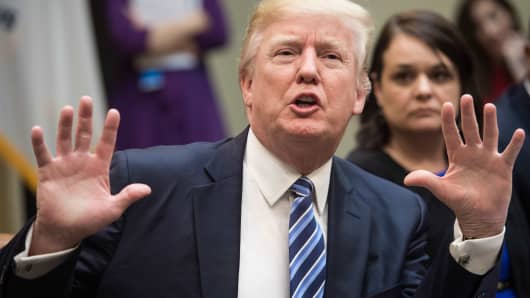Border wall? Maybe we don't need a wall after all.
Illegal Mexican border crossings to the U.S. went down 40 percent in President Donald Trump's first month in office, Department of Homeland Security Secretary John Kelly said recently.
Oh, and it's all happening before we have even a blueprint for that "big and beautiful" border wall President Trump keeps promising us. And the reason is simple: The fear of a crackdown on illegal immigrants can be greater and more powerful than a wall.
Remember that an illegal border crossing into the U.S. is risky enough, but if the chances of getting deported once inside the country have just gone up significantly, it starts to look like a much better option not to try in the first place.
Think about what happened in 2014: Fueled by rumors and false news reports, tens of thousands of Central American migrants trekked across Mexico under the false belief that the Obama administration had essentially opened the U.S. border to young people. The U.S. apprehended as many as 68,000 of them, but the deluge did not subside until President Obama called it an "urgent humanitarian situation" and the actual U.S. position on the matter was clarified in the American and Central American news media.
That leaves us with the obvious question: If simply promising to crack down on illegal immigration works so well, why do U.S. taxpayers need to foot the bill for a new border wall project at all?
The answer is we probably don't. If curbing illegal immigration is really the goal, that is. But now that President Trump and others have called for building the wall also as an important jobs and infrastructure project, there are other factors at play. So don't bet against that wall just yet.
And it isn't all about politics. To be clear, a key part of the ongoing deterrence of illegal immigration and illegal border crossings of any kind is improving its physical security. Tough talk on deportations needs to be backed up with action from time to time to keep that message alive and potent. Plus, President Trump and his supporters would like to see something that resembles more permanent border security that would survive beyond his presidency.
But the current price tag according to Senate Majority Mitch McConnell is $12 billion to $15 billion. And as long as this reduced illegal border crossing trend continues, the Trump administration will have the luxury of scoring enough political points with a smaller and less expensive project. Reduced illegal immigration to the tune of 40 to 50 percent would justify that without handing the Democrats and other Trump opponents the "victory" of getting the project scaled down.
Maybe that was the Trump team's plan all along: Promise a big wall and mass deportations, reap the benefits of reduced illegal immigration, and then green light only token changes after that reduction becomes more widely reported. But either way, the first month of the Trump presidency has taught us all something very important about the power of messaging compared to the power of actual policy.
So far, it's Messaging 1, Policy 0.
Commentary by Jake Novak, CNBC.com senior columnist. Follow him on Twitter @jakejakeny.
For more insight from CNBC contributors, follow @CNBCopinion on Twitter.



